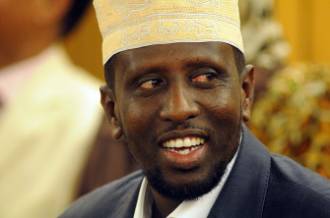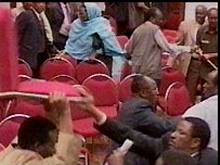[Al Arabiya] Somali Prime Minister Omar Abdirashid Sharmarke announced his resignation on Tuesday after a weeks-long dispute with President Sharif Sheikh Ahmed.
The long-brewing feud between the two principals resulted in Sharmarke's exit before a fully-fledged political crisis could blow up, but left the embattled government in limbo as it struggled to fend off a fierce insurgency.
"I resigned as the prime minister of the transitional federal government of Somalia after being unable to work with the president," Sharmarke told lawmakers in Mogadishu.
"Interest of the nation"| (the entire hectare in Mogadishu) |
"I did it for the interest of the nation at this critical moment," he said, referring to the daily fighting pitting al-Qaeda-inspired insurgents against government troops backed by an African force.
"I wish the TFG (government) to overcome the crisis in the country and bring peace and normality," Sharmarke said, adding that he had advised all his ministers to continue working with the president.
Somalia's parliament had already tried to oust Sharmarke in May but the premier had declared the vote unconstitutional and refused to resign.
Speaking to reporters in Mogadishu on Sunday, Sharmarke had acknowledged the crisis between him and the president but had played down his chances of being sacked or facing a vote no-confidence.
"It's not a secret that me and the president do not see eye to eye," he said. "We had a bit of a political storm, having kind of different views on different issues among our leadership."
Sharif has blamed Sharmarke and his government for failing to root out the Shabaab, an extremist militia which controls most of the country and has been closing in on the Western-backed administration's Mogadishu quarters.
While funding has been erratic for the transitional government's fledgling army, many observers argue Sharif himself has under-performed on the security front and has failed to rally broad popular support for the TFG.
Another contentious issue is the constitution which is meant to replace an interim charter when the mandate of the transitional federal institutions expires next year.
"Particular time" in Somalia
The president reportedly wants it to be submitted to a popular referendum, but Sharmarke argues the security situation does not allow for a credible ballot and says the document should be scrutinized by parliament.
"It's really unfortunate to have such a situation at that particular time," Sharmarke admitted, in reference to ongoing efforts led by the African Union mission in Somalia (AMISOM) to scale up its operations against the Shabaab.
The row between Sharif and Sharmarke confirmed an all-too-familiar pattern of bitter rivalry between the administration's top three officials.
In accordance with the country's transitional federal charter, the president, the prime minister and the speaker of parliament each have to belong one of Somalia's three main clan groupings.
Sharmarke was endorsed as prime minister in February 2009, replacing Nur Hassan Hussein "Adde", who had his own disputes with former president Abdullahi Yusuf Ahmed.
Yusuf was also involved in bitter political feuds with Adde's predecessor Mohamed Ali Gedi, who was forced to resign in 2007.
Sharmarke, 50, makes a sharp contrast with Sharif. The portly Sharmarke prefers Western suits and wears black-rimmed glasses while Sharif, a former geography teacher and cleric, is rarely seen without his prayer cap.
The son of former Somali president Abdirashid Ali Sharmarke who was assassinated in 1969, the outgoing premier holds Canadian citizenship and a master in political economy.
His pairing with Sharif had been seen abroad as Somalia's best chance in years, Sharif being tasked with defusing the Islamist insurgency and Sharmarke with running the government competently and wooing the large Somali Diaspora. |
 MOGADISHU, Somalia -- Former Somali Defence Minister Mohiyadin Mohamed Haji has been confirmed dead in a blast inside his car near Mogadishu’s KM4 junction on Monday, Garowe Online reports.
MOGADISHU, Somalia -- Former Somali Defence Minister Mohiyadin Mohamed Haji has been confirmed dead in a blast inside his car near Mogadishu’s KM4 junction on Monday, Garowe Online reports.

 Islamist leader Sheikh Sharif Ahmed on Saturday was elected Somalia's president, leaving him in charge of a fragile peace process aimed at ending 18 years of civil conflict.
Islamist leader Sheikh Sharif Ahmed on Saturday was elected Somalia's president, leaving him in charge of a fragile peace process aimed at ending 18 years of civil conflict.  Somalia's president on Wednesday defended his efforts to fire the country's prime minister after being sharply criticized by the U.S. and Kenya, while lawmakers said they would seek to impeach the president.
Somalia's president on Wednesday defended his efforts to fire the country's prime minister after being sharply criticized by the U.S. and Kenya, while lawmakers said they would seek to impeach the president.